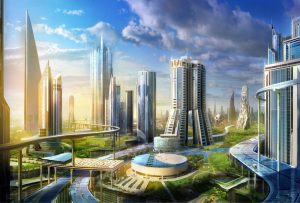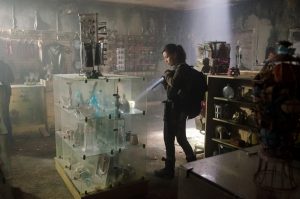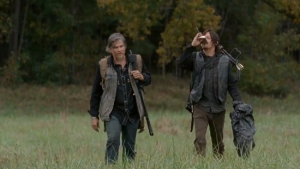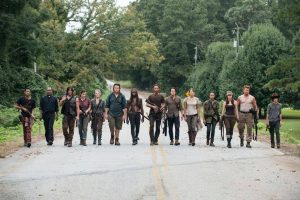
Utopia in an Apocalypse
The presence of Utopian ideals can be found throughout entertainment, from country music stars singing about the perfect truck to movies that envision societies protected by people with superhuman capabilities. These ideals exist to offer consumers of popular culture a taste of what life could be under these such conditions. These tantalizing fictional conditions are in turn used to distract people from the harsh realities of everyday life. Not only does entertainment offer utopian ideals, it provides distraction from the realities of everyday life by presenting the image of an idealistic society.

There is no form of entertainment more riddled with utopian ideals than the TV show. For this essay let us look to a TV show that does not scream utopia but instead suggests the exact opposite. Upon initial inspection AMC’s hit show The Walking Dead seems to portray the bleakest world imaginable: one where society has been toppled by a global pandemic of zombies, leaving behind a lawless wasteland crawling with reanimated human corpses. However even in such a seemingly bleak TV show there lives utopia.
The crumbling of government and society produces one of the first aspects of utopia. With stores and warehouses deserted and cars and houses left sitting empty, the remaining survivors of the zombie apocalypse have a nearly unlimited surplus of a multitude of consumer goods. When Glenn escapes Atlanta ahead of the van, he does so in a sports car that he hot-wired in the streets of downtown. When faced with RV breakdown on the highway, Rick’s group of survivors can simply scavenge parts from the abandoned cars that line the side of the road. In the world created in The Walking Dead, there is no need to spend money. With money no longer a constraint, the characters in The Walking Dead can consume whatever goods they desire, whether it is the entire jar of chocolate frosting Carl eats in the 4th season or the previously mentioned sports car that Glenn gets to drive around. When members of the group need anything ranging from medicine to food to tools, they say that they are going on a supply run. From abandoned cars to empty supermarkets to building materials left at vacated construction sites, the group is literally surrounded by nearly every type of consumer good imaginable. To obtain anything that is in demand they merely have to go on a run to get it.

Societal collapse means something else for the post apocalyptic survivors of the Walking Dead: an absence of law enforcement. With this comes the abandonment of nearly all laws and rules that were once fundamental to the structure of society. While this may seem like pure anarchy, it in fact takes shape as a rather perverse form of Utopia. In the 4th season of the Walking Dead, during the Episode Us, Daryl is seen with a group of six men known as the Marauders. They had encountered Daryl earlier and were about to kill him before deciding that he was “one of their type” and allowing him to join the group. As Daryl walks across a field with the Marauders, the leader of the group, Joe, offers Daryl a drink from his hip flask. Daryl accepts it, remarking that he hasn’t been drunk before noon since “before everything fell apart.” Joe responds by saying that “seems to me like things are finally starting to fall together.” This implies that, at least for some, the lawlessness of a post-apocalyptic world is utopian because it frees them from law and societal constraints. With nobody to stop them, groups like the Marauders have the freedom to do whatever they please, ranging from seemingly harmless acts like sleeping in any house they choose to far darker, perverse acts like raping and killing people they encounter. This freedom, though sometimes used for the most abhorrent of acts, is nevertheless a Utopian aspect because it removes all possible constraints on the characters of The Walking Dead.

Another Utopian aspect of The Walking Dead is that it is an equalizer, erasing not only social divisions but also everyone’s past wrongdoings, allowing people to reinvent themselves. Once a lowly pizza delivery driver, Glenn emerges as a deadly combatant and strategist crucial to the group’s survival. Likewise, Daryl Dixon sheds his past as a racist, white-trash, meth-dealing biker to become a compassionate, well-liked character who routinely saves the life of those in his group. As Rick says on the rooftop in Atlanta, “there is no more white and black, only living and dead.” In The Walking Dead everyone is viewed as equal and is given a fresh slate with which to define themselves.
A final utopian quality in The Walking Dead is the strong sense of community the group forms as they endure unimaginable hardships and horror. This sense of community is so strong, in fact, that the group routinely refers to one another as family. In the fifth season the group is seen trekking towards Alexandria with no food or water in the midst of a drought, all the while being pursued by a herd of zombies. They are intercepted by a member of the Alexandria settlement who marvels at how close-knit the group is. He notes that, despite battling thirst, hunger, and an ever present herd of zombies, the group refrains from quarreling or lashing out at one another. This is a testimony to the unparalleled strength of community and family that this group has formed. This type of bond between people who previously had nothing in common is something that can only be found in situations as dire as the ones presented in The Walking Dead. Therefore, utopianism exists once again in The Walking Dead because it depicts a world where people with no shared background can come together to support one another and grow close enough to call themselves family.

The TV show The Walking Dead is filled with Utopian ideals like unlimited supplies of consumer goods, equality and a fresh start for everyone, freedom from the constraints of laws and society, and the ability to forge familial bonds with strangers. These qualities distract viewers from the realities of everyday life by allowing them to imagine what it might be like to never spent money on groceries and car parts, or what they would be able to do if they were given the chance to reinvent themselves. In fact, The Walking Dead isolates specific things that everyday Americans struggle with, like paying for household goods or the lack of a sense of belonging to a community. The TV show then presents a world where these issues become irrelevant. The utopia laid out in The Walking Dead placates viewers by giving them a glimpse of what life could be like if the problems they grapple with everyday didn’t exist.
This holds true for the vast majority of entertainment. Producers of pop culture play off of the fears of their audience in order to further captivate them. The entertainment churned out by the culture industry presents idealistic conditions that eliminate the things that cause stress for people in everyday life. Presenting viewers with a sense of what life could be like under these conditions distracts them from the hardships that they face in their own lives. By watching The Walking Dead we can forget about our account balances, our social standing, or our parking tickets. We can picture ourselves in a world where none of these things exist. We can picture ourselves in Utopia.
Bibliography
Totten, Michael J. “The Walking Dead in an Age of Anxiety.” City Journal, Manhattan Institute , 27 Jan. 2016, www.city-journal.org/html/walking-dead-age-anxiety-13688.html.
Dyer, Richard. “Entertainment and Utopia.” Only Entertainment, Taylor and Francis, 2005, pp. 19–35.